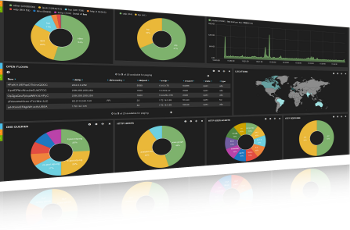Haka meets Kibana - Hakabana
We are pleased to announce the release of new haka packages:

-
Haka 0.2.1: Haka in an open source security oriented language which allows to describe network protocols and apply security policies on (live) captured traffic. This new version features new modules allowing to export network events such as protocol details and haka alerts to an elasticsearch server.
-
Hakabana 0.2.1: Hakabana is a monitoring tool that leverages on the newly added modules to extract various information on the network: bandwidth, geoip data, http and dns details and made them available through a kibana dashboard. Hakabana provides easy customization enabling to export your own data (e.g. write a new dissector and expose some of its fields).

